This story was originally published in Modern Farmer and is republished here as part of Covering Climate Now, a global journalism collaboration strengthening coverage of the climate crisis.
Chris Rauch was strolling past booths at the annual ag show in Spokane last summer when he spotted a large jar full of basalt powder. A nearby sign urged him to spread it on his croplands to help improve soil pH.
Rauch looked at the gray dust and shook his head.
“That’s crazy,” he thought. “Why would I want to put even more rocks in my fields?”
Rauch grows dryland wheat in the rolling gold-brown hills surrounding the Pendleton, Oregon, municipal airport. His farm lies on the Columbia Plateau, a 63,000-square-mile basin formed by ancient basalt lava flows. At the end of the last Ice Age, retreating glaciers scoured the bedrock, leaving a wake of grit and gravel to form the deep loess soil.
Not much rain falls in this grassland habitat. Some years, it’s 9 to 12 inches, but lately, it’s more like 6 to 9. Pre-cultivation, the region owed the healthy pH of its soils to the lucky coincidence of sitting atop a volcanic bed. However, the topsoil is powerless to counteract the acidifying effect of ammonia-based fertilizers. Over the years, this has caused pH levels to drop to 5 and below, according to Dr. Francisco Calderon, director of the Columbia Basin Agricultural Research Center.
“It’s not a widespread problem yet, but it’s rearing its ugly head in some places,” says Calderon.
A few weeks after the ag show, Rauch got the latest results of his soil pH tests: 5.3. He recalled the message from the ag show booth, run by a company called UNDO. The crushed rock raised soil pH levels. And it was free.
His first thought was, why? It seemed too good to be true. Yet the more he read, the more it seemed legit.
“You can’t beat zero,” he finally decided, and gave UNDO a call.
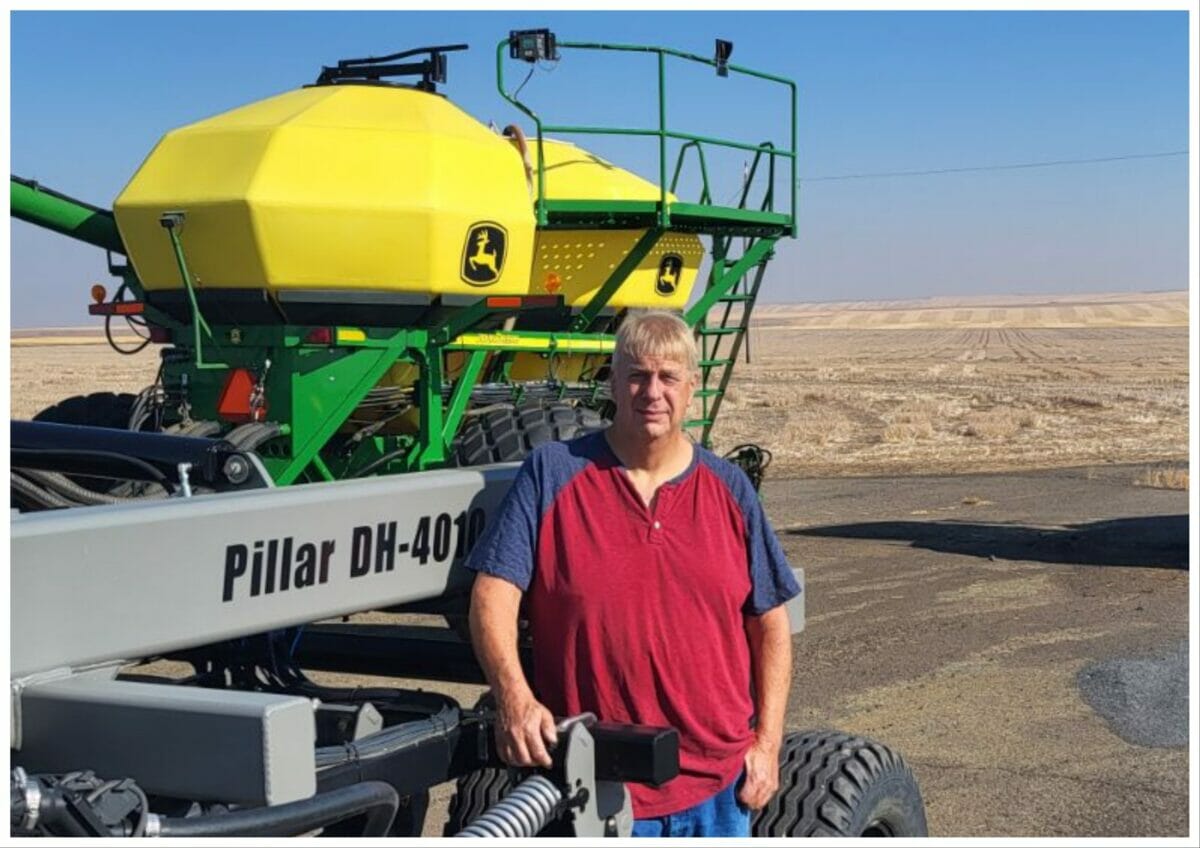
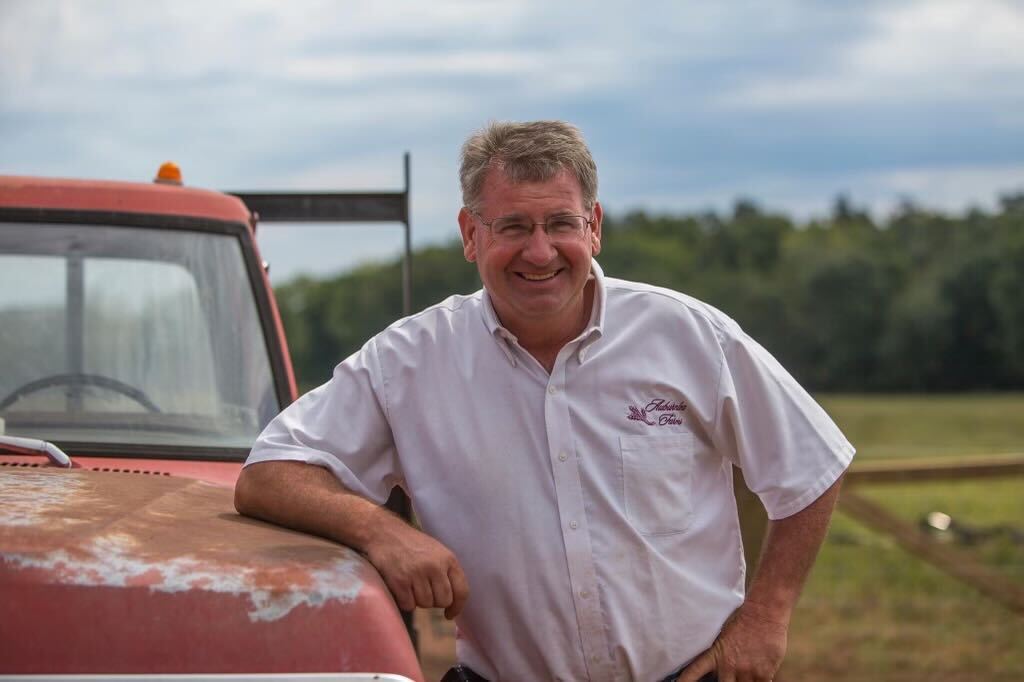
Left: Chris Rauch’s Oregon farm lies on the Columbia Plateau, a region that has seen increasing levels of soil acidity. (Courtesy of Chris Rauch) Right: Virginia farmer Rick Bennett contracted with Lithos Carbon to test ERW on his soybean fields. (Courtesy of Rick Bennett)
Rauch is one of many farmers taking a chance on a new process called Enhanced Rock Weathering, or ERW. Startup companies across the country are bringing crushed volcanic rock to farmers’ fields and spreading it to improve their soils. The rock powder, usually basalt, is often scavenged from local mines or quarries, where it exists as a waste by-product. ERW companies collect the rock powder, sometimes milling it further to reduce the grain size. Then they truck it to farms, where it is used in place of ag lime. Studies show that volcanic rock dust can raise the pH of overworked soils, improving productivity. And because enhanced rock weathering is considered a form of permanent carbon dioxide removal, the startups can sell “carbon credits” to large corporations like Microsoft that want to reduce their carbon footprint and show they are acting on climate change.
The method is based on decades of scientific research that exploits what some call “earth’s thermostat.” Carbon dioxide in the atmosphere naturally reacts with water to form a weak acid. This acid then bonds with minerals in volcanic stone and permanently removes the CO2 from the air. Geochemists discovered that this natural carbon cycle could be accelerated by crushing the rock, which exposes more of its reactive surface. A study published last month by the American Geophysical Union stated that ERW had the potential to sequester more than 200 gigatons of CO2 in a 75-year period. That would put a small but meaningful dent in the world’s CO2 emissions, which currently stand at around 37 gigatons per year.
Saving the world wasn’t on Rauch’s mind as he watched a spreader rumble over his fields, delivering what looked and sounded like dirty sleet. Rauch was worried about seeding, soil compaction and whether he’d end up with one giant gravel pile. To his surprise, the basalt blended with his soil as if it were just one more thing that had blown in on the wind.
According to Zoe Young, UNDO’s local agent in the Pacific Northwest region, Rauch’s skepticism is a common response. At first, farmers think it sounds crazy. Then they want to know why they’re being offered something for nothing.
“It seems sneaky,” she says.
Young attributes farmers’ doubts to their fraught history with well-meaning programs.
“The green industry has taken advantage of farmers in a lot of ways,” she says. Farmers join waitlists for solar panels in exchange for not farming their fields, then the solar companies never show up. Or they’re tricked into signing multi-year contracts.
“Farmers can see the benefit for their farm,” Young explains. “But they say, ‘You’re just cashing in on the new bullshit market.’”
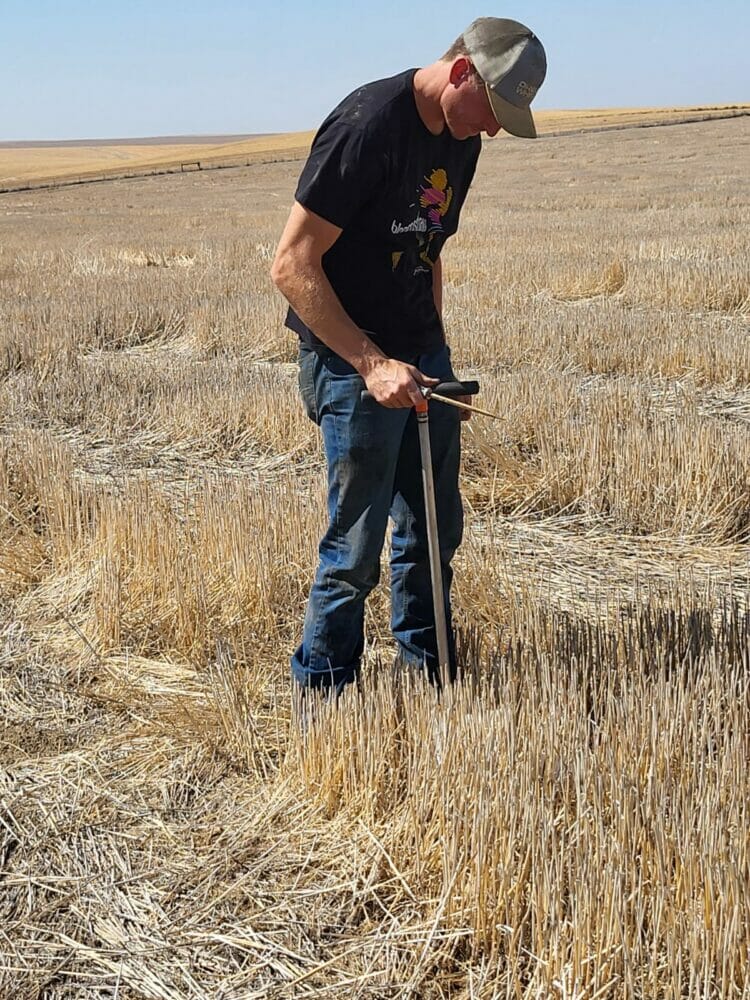
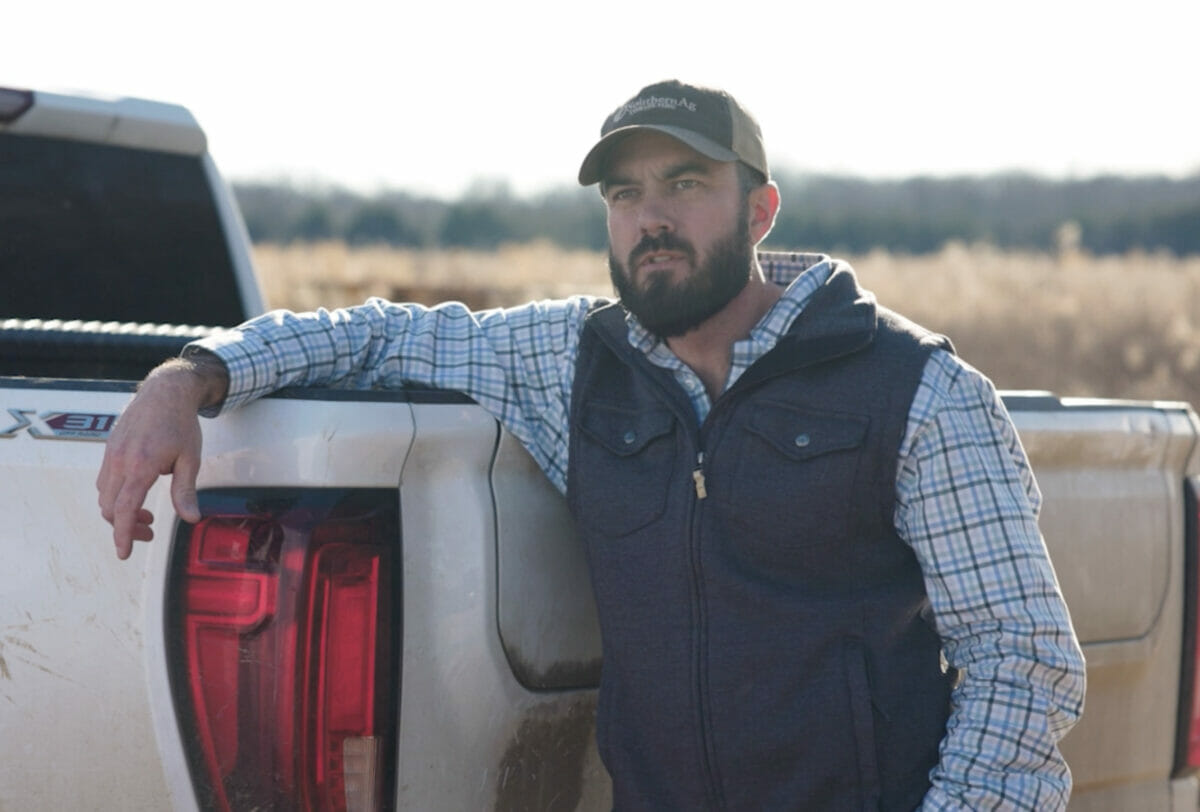
Left: Chris Rauch’s son Andre pulls soil samples from their dryland wheat farm. (Courtesy of Chris Rauch) Right: Dan Prevost is a Mississippi farmer and agricultural consultant for EION, a company that uses olivine to lay down rock dust in the Mississippi River Delta region. (Courtesy of EION)
Michigan, the state shaped like a mitten, has acidic soils up towards its fingertips and alkaline soils down in its palm, where agricultural consultant Jesse Vollmar lives. The clay loam soil there is relatively good, with a natural pH between 6.5 and 7, and rainfall is an enviable 20 inches per year. While these Midwest conditions may sound ideal for farming, years of tilling and heavy fertilizer use have taken their toll.
Vollmar is from a 5th-generation farm family. He began his career helping other farmers enroll in federal sustainable agriculture programs and saw their struggles firsthand. Farmers needed years’ worth of tillage and cover crop records to be eligible. Once enrolled, they were required to conduct regular soil tests. Payout came only after a decade.
Two years ago, Vollmar began working with Lithos Carbon, a small ERW company based in Seattle. He likes that ERW companies do all the soil tests and record-keeping and require only a one-year commitment. Vollmar remains a strong proponent of regenerative farming and believes the two should be practiced together. But in his view, the economics of ERW can’t be beat.
“It’s just a no-brainer for farmers,” he says. “The hardest part is keeping up with demand.”
A few states over in the Piedmont region of southern Virginia, farmer Rick Bennett is a Lithos client. Bennett grows corn, sweet beans, soybeans and cereals on old tobacco land that has seen two centuries of heavy use. The soil, a mixture of silt and clay, is acidic and low in organic matter.
Last spring, Bennett chose a particularly acidic plot and contracted with Lithos to treat it. The company created a series of test strips so that Bennett could observe the difference, and he planted soybeans over the entire area. Five months later, Bennett doesn’t see a great deal of difference, but he says he will know for certain when he puts a combine in the field.
“It’s not about looks but the number of pods and beans in the pods.”
Former professional football player turned farmer Jason Brown also tried basalt powder last spring on First Fruits Farm, his 1,000-acre farmstead in Louisburg, North Carolina. Brown donates much of what he raises to help fight hunger in his community. But he understands the razor-thin budgets of his fellow farmers, which forces many of them to pick and choose which crops they can afford to grow. Enhanced rock weathering can help ease the crunch, says Brown.
“It’s all-around mutually beneficial, but for farmers, this is a really big deal,” Brown explains. “Most times, we have to write very large checks for every amendment we add to our soils. This is one of the rare times when farmers not only get a break but a benefit.”
Brown says that local farmers are waiting to see whether first adopters like him get better soil test results—and, importantly, a check in the mail for allowing liming on their fields.
“Once that happens, I promise you that every farmer from Virginia to South Carolina is going to be waiting in [the] queue to sign up.”
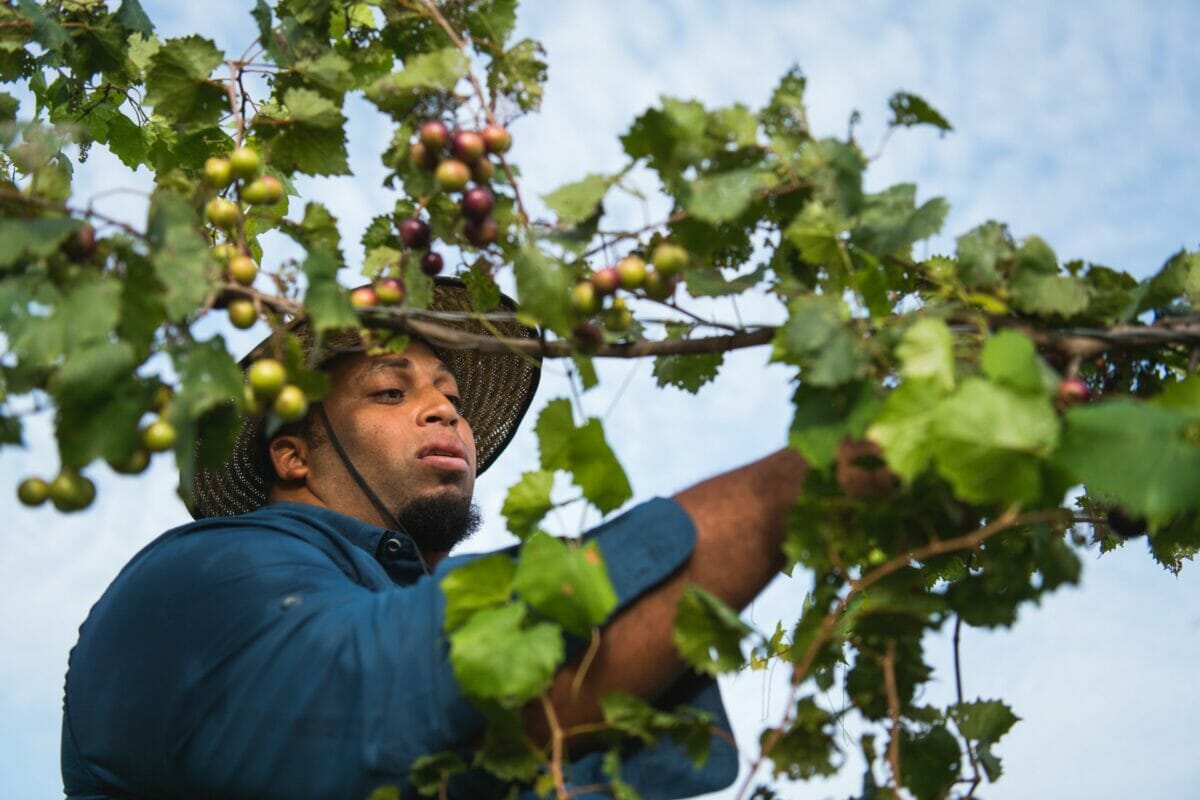
Jason Brown is testing basalt powder on his 1,000-acre farmstead in Louisburg, North Carolina.
First Fruits Farm/Facebook
Basalt is the most common volcanic rock on earth, coating the floors of most seas, underlying areas such as the Columbia Plateau, and jutting out in strange columnar formations such as the Giant’s Causeway in Ireland. But volcanoes spew out many types of molten rock. Another volcanic mineral is olivine, a greenish stone that comprises the majority of earth’s upper mantle. Studies show that olivine has a higher capacity than basalt to capture CO2 and may be quicker—at least initially—to alter soil pH.
The Princeton-based company EION uses olivine to lay down rock dust in the steamy fields of the Mississippi River Delta region. Soils there are old, red and acidic, like soils in the tropics. The landscape is a patchwork of timber, pasture, row crops, hunting habitat, and buffer strips—an ideal model for managing agricultural land for multiple ends, according to Adam Wolf, founder and CEO of EION.
“They have an appreciation for the natural world,” says Wolf. “It’s not as reductionist as in places like California, where you see vast landscapes dominated by one crop.”
Heat and humidity speed the reaction of rock weathering, and EION uses that plus olivine’s high CO2 capture rate to do more with less. The company spreads two to three tons of olivine per acre instead of nine or 10 tons of basalt. However, because local olivine sources don’t exist, EION must import the olivine by ship from Norway. Once it reaches the vast river system of the Mississippi, it can be milled and distributed to farms as far away as North Dakota.
Dan Prevost is a Mississippi farmer and agricultural consultant for EION. He rents patches of “used and abused” land near his home in south-central Mississippi and helps local farmers try out rock dust in their fields.
“I don’t own any land of my own, so I get the land nobody else wanted,” Prevost jokes.
“Rebuilding the soil is my number one priority.”
Like Vollmar, Prevost started in regenerative farming and knows the critical importance of soil pH.
“Once you get a piece of farmland, the very first thing you do is get your pH right,” says Prevost. ‘That optimizes nutrient availability. If you have a low pH, you can put all the fertilizer on that you want, but the nutrients aren’t going to be available.”
Prevost tested olivine on his land last spring. He chose a poor, acidic soil section and laid down two tons per acre, then planted corn on both treated and untreated plots. Although he’s still waiting for final data, Prevost says that the corn on the treated side was “super dark green” compared to the untreated section.
Prevost has plenty of farmers willing to try ERW, but, like Young and Vollmar, he understands their initial reluctance. Farmers are constantly harangued about the latest ‘hot topic,’ he says, from sedimentation and erosion to pesticides, nutrient loading in waterways and declining irrigation aquifers. While all are important, the sheer quantity can be overwhelming.
“Now we’re talking about climate change,” says Prevost. “Next on the list is going to be biodiversity. Farmers get jaded with things pretty quick.”
Climate programs also get a bad rap in the Deep South because they often promise unachievable carbon capture levels. Soil microbes cycle faster there than in colder, drier climates, says Prevost. Their carbon is released back into the atmosphere when they die, defeating the programs’ goals.
Prevost talks about improved pH, micro-nutrients and crop yields in his work with farmers rather than saving the planet.
“Typically, we don’t talk about climate change because that’s just another hot topic,” he says. “But everybody can pretty much agree that things are different. We’re getting more intense weather patterns—drier dries and wetter wets and more frequent hailstorms.”
Across the country, farmers are testing a new method of improving the health and productivity of their soils. From the semi-arid high desert of eastern Oregon to the subtropical floodplain of the Mississippi Delta, they’re partnering with new companies that offer an apparently legitimate something-for-nothing deal. Whether soils are naturally acidic or made so by man, volcanic rock dust appears to help restore healthy soil pH levels and, along with it, soil fertility and productivity.
The next few years should tell whether enhanced rock weathering becomes one more bothersome “hot topic” or catches on as a boon to both farmers and the planet. The lab research proves ERW’s potential; the first field data is coming in with the fall harvest.
Out in Pendleton’s golden wheat fields last month, Chris Rauch received the latest soil pH test results: 5.7-5.8, substantially higher than last year’s reading of 5.3.
Rauch was surprised.
“Whether it’s the rock or that the stars lined up that day, it’s too soon to know for sure,” he says.
“But it’s a trend in the right direction.”
>>> Read full article>>>
Copyright for syndicated content belongs to the linked Source : Grist – https://grist.org/agriculture/to-reverse-a-troubling-trend-farmers-are-adding-rocks-to-their-fields/










